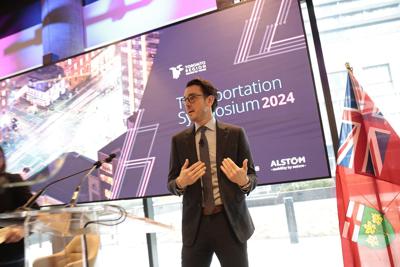OTTAWA — A high-speed rail project connecting É«É«Ŕ˛ to Quebec City has more “credibility” after being put on a list of possible “nation-building” projects, according to the company’s CEO, allowing it to be built faster and potentially cheaper than before.Ěý
The Alto high-speed rail project, connecting É«É«Ŕ˛ with Ottawa, Montreal and Quebec City, was announced earlier this year by then-prime minister Justin Trudeau who pledged $3.9 billion over six years to fund the design and engineering work for a new dedicated rail line with trains capable of travelling as fast as 300 kilometres an hour. VIA trains in that corridor can currently travel at a maximum of half that speed and are often delayed because they share tracks with freight trains.Ěý
Last week, Prime Minister Mark Carney announced the government’s new major projects office would look at the high-speed rail line, with an eye to eventually designating it as a “nation-building” project, which would speed up approvals.Ěý
Martin Imbleau, president and CEO of Alto, said there is still much work to do but he believes the planning phase of the project could now be cut in half to four years.Ěý
“Being able to say that the project could start construction in five years has a big push in terms of credibility,” he said.Ěý
Imbleau said the rail line would be constructed in four phases, and the first phase would take seven to eight years, with the whole project being wrapped up in 14 or 15 years.
He said without a firm timeline, potential suppliers were reluctant to engage with Alto, but it has seen significant interest since Carney’s designation last week. He said suppliers will have to retool in many cases to supply the project and this is a signal to start that work.Ěý
“We need 4,000 kilometres of high-carbon-density steel tracks. None, not one metre of that track, can be produced today in Canada and we need a 4,000-kilometre supply,” he said.Ěý
The project will require approvals from Transport Canada and from Environment Canada on its 1,000-kilometre route. Imbleau said Allto will still do the same amount of consultation with communities, landowners and Indigenous groups, but once that work is done it won’t have to wait six or seven years for an answer.Ěý
“It’s basically the relationship with the agencies in Ottawa. Instead of taking five, six or seven years, the promise is to take two years,” he said.Ěý
What Imbleau calls a “working assumption” is that actually constructing the project will cost $60 billion to $90 billion. He said every year of delay will cost $3.5 billion due to inflation, so speeding up the approval phase will save money.Ěý
While the federal government has committed to the initial design and engineering work, it has not yet committed to the full construction costs. During the announcement last week, Carney said the project would create 51,000 jobs, increase the country’s GDP and significantly reduce greenhouse gas emissions.Ěý
Error! Sorry, there was an error processing your request.
There was a problem with the recaptcha. Please try again.
You may unsubscribe at any time. By signing up, you agree to our and . This site is protected by reCAPTCHA and the Google and apply.
Want more of the latest from us? Sign up for more at our newsletter page.



















To join the conversation set a first and last name in your user profile.
Sign in or register for free to join the Conversation